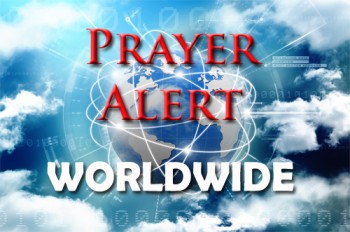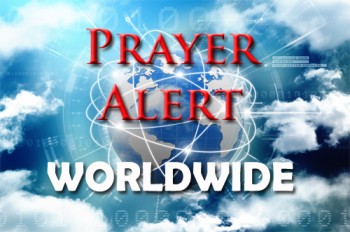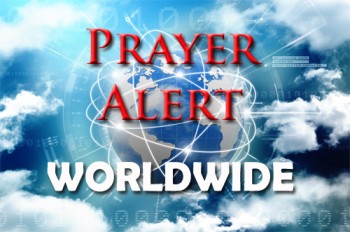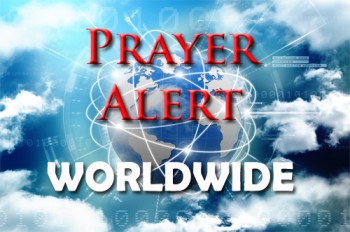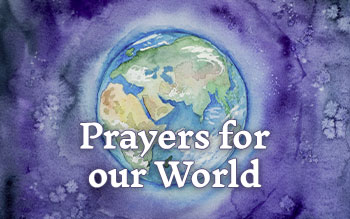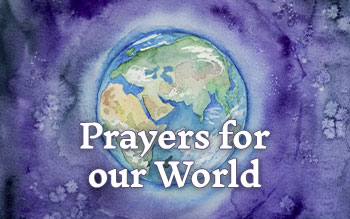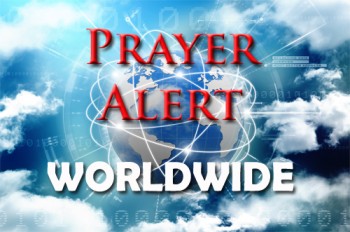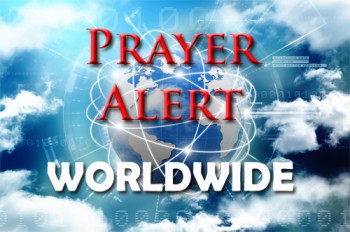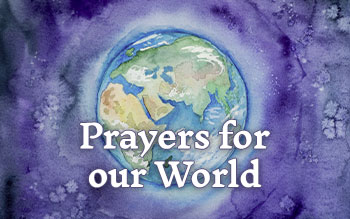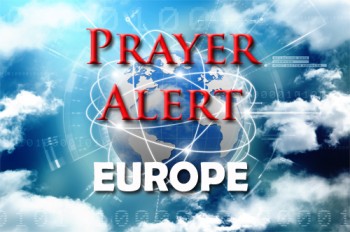Displaying items by tag: protests
Hong Kong: stalemate
On 24 November we praised the district election results which swept aside pro-establishment candidates and installed democratic majorities in 17 out of 18 districts, a stunning reversal attributed to the months of protests and voters’ deep dissatisfaction with the government. But now, three weeks later, prayer is still needed for a commission of inquiry into allegations of police brutality. Chief executive Carrie Lam is in no haste to satisfy any of the demands, which she has repeatedly dismissed as unrealistic. Several opinion polls indicate that most Hong Kong citizens support an independent inquiry, but she insists on leaving all questions about police conduct during the protests to an independent police complaints council. Beijing is in no rush to fix the problem, stating that Hong Kong will always be a part of China, and urges them to be more like their Macau counterparts in making the ‘one country, two systems’ principle work. Commentators warn of an even bigger political crisis if deep-rooted grievances are not addressed.
Australia: thousands in climate change rally
20,000 angry climate change protesters turned out in Sydney on 11 December, attacking Australia's leaders in their speeches and chants as bushfires suffocated the city with ‘lethal’ thick smoke. A firefighters’ union representative said that the fires are ‘the worst fires we have had in decades. Our members are saving lives, property, wildlife, stock and pets, but they are spread thinly as they are also responding to their regular work. The NSW Government has failed. We have got no water because the state and the country are in drought. We need a government that takes action.’ Australia is on high-alert as temperatures soar above 40C and smoke haze blankets the cities setting off fire alarms.
Iran: 200+ killed, hundreds arrested
Iran's president Hassan Rouhani has called for the release of unarmed and innocent people arrested during the two weeks of protests in over 100 cities and towns after a 300% fuel price increase. The protests have now turned political as young and working-class protesters demand that religious leaders step down. Iran's leaders, blaming 'thugs' linked to the USA, Israel, and Saudi Arabia, have urged the country's judiciary to mete out harsh sentences to those involved in the demonstrations. Amnesty International reported at least 208 deaths on 2 December. Demonstrations and deaths have continued since then. Amnesty says that families of victims were threatened and warned not to speak to the media or hold funeral services. It added that the death toll is evidence that Iran's security forces went on a horrific killing spree, and urged the international community to help ensure accountability. See
Georgia: anti-corruption activism
When the ruling party, Georgian Dream, backtracked on a promise to transition to a fully proportional parliamentary system before the 2020 elections, thousands of citizens protested, demanding a progressive electoral reform. But such protesters face smear campaigns and accusations of bias - typical of the intimidation tactics used in such situations. This also happened recently in Brazil. Those who denounce corruption and human rights abuses are often the target of disinformation campaigns, with their reports and findings dismissed as ‘fake news’. Anti-corruption activism relies strongly on trust in independent media. The use of social media and the impact of fake news is a real threat for the work of organisations like Transparency International (TI). But fake news is not always easy to detect and spreads rapidly. What can be done? In Georgia, for example, coordinated accusations against TI through anonymous Facebook posts were recently detected, labelled and debunked by another civil society group.
Iran protests: 143 Killed
Videos reveal crackdown regime tried to hide from world… One video filmed through a doorway appears to show a woman looking at a teenage boy lying in a pool of blood on a pavement, as a riot policeman swings a baton at people running past him.
Another from the southern city of Shiraz shows a crowd trying to help a motionless man on the ground, as other people retreat along a smoke-filled street amid the sounds of shouting, screaming and gunfire.
In a third. taken from inside a moving car in the capital, Tehran, a woman can be heard screaming as plainclothes security personnel or militiamen detain a man.
It was the fear of such footage reaching the outside world that prompted the authorities in Iran to shut down access to the internet for more than eight days earlier this month, as protests against a sharp rise in the price of petrol spread across the country.
Now the internet has been partially restored, videos have been appearing on social media that paint a picture of a government crackdown more brutal and bloodier than many had feared. The identities and stories of the protesters who lost their lives have also emerged.
The Iranian authorities have not released any official figures about casualties, but Amnesty International has received what it considers credible reports that at least 143 protesters were killed after the protests erupted on 15 November.
The human rights group says the deaths resulted almost entirely from the intentional use of firearms by the security forces - though one man was reported to have died after inhaling tear gas and another after being beaten. Amnesty believes the death toll is significantly higher, and activists and official sources inside Iran have told BBC Persian that it exceeds 200.
However, the videos filmed by Iranians on their smartphones - many of them graphic and difficult to watch - have cast doubt on the government's claims. The footage appears to show security personnel and members of the paramilitary Basij force, which is frequently used to help suppress dissent, beating up unarmed protesters in the streets and firing live round into crowds at close range.
Sources inside Iran have told BBC Persian that the number of detainees is in the thousands. Despite the assertion by the Supreme Leader Ayatollah Ali Khamenei that the protesters had "roots outside of the country", the Ministry of Intelligence told parliament that most of those held were unemployed youths from poor families.
Journalists based in Iran were limited in their ability to report on the protests or were too afraid to do so, and those based elsewhere were hampered by the internet shutdown. But BBC Persian, which is banned from Iran, was able to get in touch by telephone and other means with citizen journalists, activists and other trusted sources on the ground. Their videos showed the protesters targeting symbols of the government, the clerical establishment and the security forces, as well as banks and petrol stations.
The epicentres of the protests were predominantly Kurdish towns on the western border with Iraq, as well as areas on the outskirts of major cities like Tehran, Karaj and Shiraz. All are places with among the highest levels of unemployment in the country.
“The price of petrol is rising, we are poorer,” protesters in Shiraz chanted in one video.
“The supreme leader lives like a God. We, the people live like beggars,” said people in Malard, near Tehran in another.
“No to Gaza, no to Lebanon. We sacrifice our lives for Iran” was a chant heard in Isfahan.
Clearly, there is disquiet about Iran’s activities in the Middle East. The Islamic Revolution Guard Corps (IRGC) has spent billions of dollars arming, training and paying militias in the region, saying that if the force does not fight Iran’s enemies beyond its borders then it will have to face them on the streets of Tehran.
But the protesters in the streets believe the money should have been invested in their country and their future.
US sanctions reinstated by President Donald Trump last year when he abandoned a nuclear deal with Iran have targeted the country’s oil and banking sectors. The sanctions, combined with corruption and mismanagement, have pushed the Iranian economy to the brink of collapse. But the crisis has not persuaded the government to change its policies.
Victims’ stories
State media and newspapers close to the security forces depicted the protesters as hooligans, who they said were seeking to loot and vandalise public property.
But the stories BBC Persian has heard from the families of those killed paint a different picture.
Fatima, a 40-year-old mother of two, was one of the demonstrators killed near Tehran.
Her family said she went out to protest against unemployment and inflation.
Another victim was Armin Qaderi, a 10-year-old boy, from Kermanshah. He died after going out to buy bread, according to his family.
Many families told BBC Persian that their relatives went out to express their anger at the economic crisis but that the authorities answered them with bullets.
More at: https://www.bbc.co.uk/news/world-middle-east-50562584
Pray: for the government of Iran to review its international policies and to listen to the concerns of its people.
Pray: for the heavy-handed violence and indiscriminate shooting of peaceful protestors by Government forces to stop.
Pray: for millions of Iranians whose livelihoods have been adversely affected by the economic sanctions and corruption that a positive breakthrough will happen soon.
Pray: that the voice of the Iranian people will be heard and these protests will not be in vain.
Latin America: Cold War 2.0?
Many geopolitical media watchers and prayer warriors believe the growing wave of anti-government protests ravaging the streets of Ecuador, Chile, Bolivia and Colombia hasn’t been seen since the old Cold War which is why the increase in protests and tensions might be called Cold War 2.0 in Latin America.
This time, at least as yet, there aren’t armed proxy groups in play but Moscow has weaponized social unrest to sabotage Western power in the region.
Earlier this decade we saw similar issues on Russia’s strategic periphery, notably in Ukraine in the wake of the 2014 Maidan protests and the 2005 Orange Revolution. These protests aren’t necessarily armed Marxists but anti-government protesters armed with anti-U.S. rhetoric.
Much the same approach is evident in Moscow’s support for Nicholas Maduro’s failing regime in Venezuela and with the help of Cuban operatives. Russia has become increasingly adept at using social media to disperse disinformation on the Internet.
Pray: for God to prevent cold wars through economic trade, cyber or arms race. (Psalm 2: 1,2a,4)
Pray: for peaceful and democratic routes to be brokered for the unrest in these Latin American countries.
Pray: that super-powers stop interfering with these vulnerable countries for their own gain.
Pray: for the Christian Church in Latin America, that it will continue to flourish and grow despite the economic and political tensions.
Iraq: protests and scandals
Anti-government protests over corruption and lack of jobs and public services have continued since early October. On 21 November, force by security guards failed to unblock Baghdad bridges and al-Tahrir Square where hundreds of protesters held their ground against bullets and teargas. They also have blocked roads around Basra. Road closures lead to large losses for the Iraqi economy and negatively affect the daily life of citizens by preventing the flow of food, medical supplies and other goods. Demonstrators demand comprehensive political reform, accountability for corruption, improvement of public services, and job opportunities. But protests are not reshaping the country's politics. They are affecting the entire region as new scandals against the government are revealed almost daily. The most recent exposed Tehran's growing influence in Iraq.
Hong Kong: student casualties
Chow, a university student, fell from the third floor of a car park while fleeing tear gas and suffered a significant brain injury as a result. A third-year journalism student, surnamed Tang, was arrested on 2 November when covering protests in Taikoo Shing. His university’s student union said that when he was arrested, he was wearing his press card and journalists’ association membership card, and had not taken part in any of the frontline protest activities. Pray for police to respect the rights of student reporters and ensure their safety when they are performing their duties. Also, the university has asked the police commissioner for full details about a qualified St John Ambulance first aider student who suffered serious burn injuries after being hit by a tear-gas canister while performing his duties. Students and alumni are demanding that the universities condemn police violence as they handle anti-government protests.
Iraq: 220 killed in violence despite curfew
Iraq protests:
There has been an upsurge of violence in Iraq as anti-government protests enter a fifth day, amid reports of bloodshed in the holy city of Karbala.
Reports say up to 18 people were shot dead by security forces there. However, officials denied anyone was killed.
In the capital, Baghdad, thousands of protesters have defied a curfew to demand jobs, better public services and an end to corruption.
Prime Minister Adel Abdul Mahdi is under growing pressure to resign.
On Tuesday the influential Iraqi Shia cleric Moqtada Sadr said he would join forces with another powerful politician, Hadi al-Ameri, to bring Mr Abdul Mahdi down through a vote of no confidence.
More than 220 people have died across the country since anti-government demonstrations broke out at the beginning of the month. A first wave of protests gave way to a brief lull, but fresh unrest began five days ago.
What happened in Karbala?
In Karbala - a major centre for Shia Islam - the situation remains unclear, but a number of medical sources and eyewitnesses, backed up by video footage, suggest at least 18 people were killed and hundreds wounded in clashes with the security forces.
Rupert Colville, the spokesman for the office of the UN High Commissioner for Human Rights, said they were trying to get more information about the situation.
"We have received particularly disturbing reports on what has been going on in Karbala... In both those reports [United Nations Assistance Mission for Iraq (Unami) and an Iraqi government committee], they recognise that excessive force has been used."
He called on local authorities in the city to ensure security forces acted with restraint and investigate the shootings.
The local governor and the police chief in Karbala have denied any protesters were killed, saying that videos circulating widely that show protesters running away from gunfire have been fabricated.
What about Baghdad?
Thousands of demonstrators vowed to continue their protests in the city, filling up the Iraqi capital's central Tahrir Square on Tuesday.
At least 74 people were killed and 3,500 others were injured over the weekend as the protests resumed in Baghdad and elsewhere following a two-week pause that organisers said was designed to give Iraq's leaders time to respond to their demands.
Mr Abdul Mahdi has promised to introduce reforms but protesters remain determined to try to sweep away his government.
On Monday, security forces fired tear gas to deter any attempting to cross a bridge to the fortified Green Zone, which houses government offices and foreign embassies.
After the first wave of protests earlier this month, the prime minister promised to carry out a cabinet reshuffle and cut the salaries of high-ranking officials. He also said he would allocate $66m ($51m) to support the unemployed, set up training programmes for youths, and build 100,000 homes in poor areas.
Will the government survive?
The prime minister has consistently rejected demands by Moqtada Sadr, who leads parliament's largest bloc, to resign and hold snap elections.
Mr Ameri, who heads the second largest group in parliament, has previously backed the government. But on Tuesday he announced that he and Mr Sadr would "work together to achieve the people's demands".
Mr Sadr had earlier issued a public invitation to Mr Ameri to co-ordinate on a no-confidence vote in parliament.
More at: https://www.bbc.com/news/world-middle-east-50225055
Pray: for a speedy resolution and that the politicians react positively in the best interest of the Iraqi people.
Pray: for restraint on both sides and an end to the excessive force being used by the authorities.
Pray: for the families and loved ones of the deceased.
Pray: for an end to the corruption that pervades the government and public services in Iraq.
Spain: pre-election protests
On 10 November Spain will have its fourth general election in four years. The Socialists received the most votes in April’s election, with Catalan separatist parties increasing their number of MPs. Since then, the supreme court has sentenced nine pro-independence politicians and civic leaders to a total of 100 years in prison. These sentences brought thousands of Catalonians onto the streets of many cities, and further violent clashes by far-right counter-protesters. Petrol bombs, blazing barricades, and vandalised buildings are new for Catalan’s pacifist independence movement, but the graffiti on a Barcelona wall read, ‘You have shown us that being peaceful is useless’. Hundreds have been injured in confrontations with security forces. The latest event was a ‘clean protest’ when protesters put detergent in a fountain, as a message to ‘clean up the mess from Spain’. One protester said demonstrations would continue until all the political prisoners were freed. See
